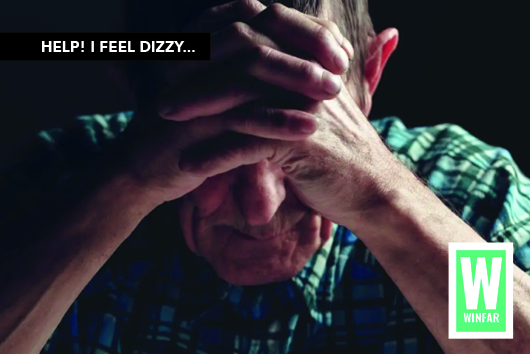When it comes to dizziness a common ailment among seniors, there is a lot you can do to help them cope better and ultimately improve their quality of life
So what exactly is happening when you feel dizzy, and what should you do about it? Dizziness is a common sensation that can affect just about anyone, at any point in their lives. Sometimes it’s a fleeting experience, while for others, it becomes a recurring issue. Let’s delve into the world of dizziness, covering its various causes, what to watch out for, and how to address it.
First and foremost, experiencing dizziness can increase your risk of taking a tumble, which can be especially concerning for seniors. In fact, approximately 25 percent of individuals over the age of 72 report episodes of dizziness, which is often treatable. Common causes include migraines, inner ear problems, low blood pressure, medications, and anxiety. If you’re a senior especially, experiencing dizzy spells, it’s crucial to understand what might be causing that feeling of unsteadiness and how to manage it.
Dizziness comes in different forms, and it’s important to distinguish between them. The Vestibular Disorders Association provides some helpful distinctions: Dizziness can be a sensation of light-headedness, faintness, or unsteadiness. On the other hand, vertigo is characterized by a spinning or rotational sensation, as if you or your surroundings are in motion. Disequilibrium, another type of dizziness, entails unsteadiness, imbalance, or a loss of equilibrium, often accompanied by spatial disorientation.
To fully understand why dizziness occurs, we need to peek inside our brains. Our brains rely on three main systems to maintain balance: vision, proprioception (sensory input from touch receptors on the feet and body), and the vestibular system (the inner ear). You’ve likely experienced spatial disorientation when sitting in a stationary car while the vehicle next to you moves forward. Your eyes tell your brain you’re moving backward, but your body’s sensory receptors and inner ear disagree. This mismatched information can lead to discomfort, but our brains usually resolve it quickly. By default, our brains prioritise signals from the vestibular system, so when there’s an issue with the inner ear, we perceive it as dizziness or vertigo because our brains can’t reconcile the conflicting information.
Now, let’s explore some common reasons for dizziness. Before we do however, please note, this information is for informative purposes only, and by no means comprehensive. Should you be experiencing dizziness, don’t hesitate to consult your GP for a proper evaluation and guidance. Your golden years should be enjoyable, and addressing dizziness can help ensure they remain that way.
Common causes of dizziness
– Migraines
– Inner ear problems
– Dehydration
– Hunger
– Fatigue
– Low blood pressure, especially evident when an older adult stands up or sits up too quickly.
– Some medicines have dizziness as a side effect.
– Taking multiple medications
– Certain medications, including herbal supplements, can cause unsteadiness or dizziness
– Changes in your eyeglass prescription or the presence of cataracts
– Viral infections
– Ear infections
– Arthritis
– Neuropathy (loss of feeling or nerve damage, especially in the feet)
– Migraines
– Allergic reactions
One common cause of vertigo, often referred to as ‘crystals in the ear,’ is benign paroxysmal positional vertigo (BPPV). This condition occurs when tiny hairs in the inner ear responsible for detecting gravity become dislodged. The good news is that it’s treatable. A specialist can manipulate your head in various directions to clear the debris from your inner ear. However, BPPV can reoccur, necessitating repeat treatments.
Beyond these common causes, there are several other chronic conditions and diseases that can precipitate dizziness, including diabetes, hypertension, multiple sclerosis, and Parkinson’s disease. Each of these can lead to light-headedness and dizziness. Proper management of these conditions is vital. Regular checkups with your GP will provide an opportunity to discuss your symptoms with your doctor and adjust your medications if needed, promoting overall health and potentially reducing dizziness.
Sometimes, dizziness can signal more serious issues, such as conditions that restrict blood flow to the brain or put pressure on the inner ear. This can make it frustrating to arrive at a definitive diagnosis, but being clear about the duration of your symptoms, identifying any triggers, and ruling out potential causes from the list above can aid in the diagnostic process.
Remember, the information provided here is a general overview and not intended to diagnose or treat any condition. If you’re experiencing dizziness or have health concerns, seek advice from a healthcare professional.
How is dizziness treated?
How to best manage dizziness, will of course depend on what is causing your dizziness.
In the meantime however, there are effective ways to treat dizziness:
If you are feeling dizzy or light-headed you may find the following advice helpful:
- When you feel dizzy, stop what you are doing and sit down until it passes.
- If you feel faint, try lying down flat. This will allow blood to reach your brain quickly.
- Make sure you drink enough fluid — at least 6 large cups of water every day, unless advised otherwise by your doctor.
- Rest as much as possible.
- Change positions slowly, especially when you are standing up after lying down. Try to sit for a couple of minutes before standing up.
- Avoid sudden, fast movements of the head, such as looking up or around too quickly.
- Consider using a walking aid.
https://www.healthdirect.gov.au/dizziness#treated
Dizziness – Symptoms and causes
Dizziness – symptoms, treatments and causes
Dizziness: Causes & Treatment
Dizziness: Causes, Related Symptoms, Treatment, Diagnosis
What to Know About Dizziness in Older Adults
Causes of Dizziness in Seniors
Surprising Conditions That Cause Dizziness in Seniors

